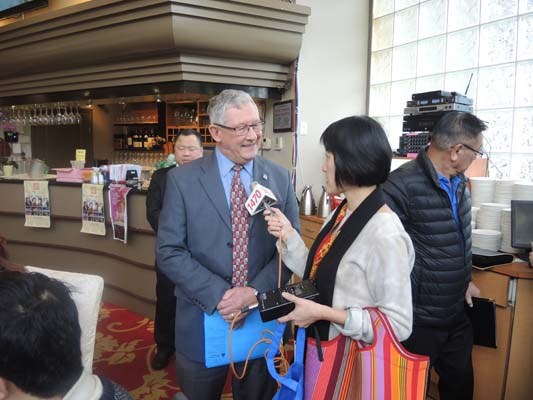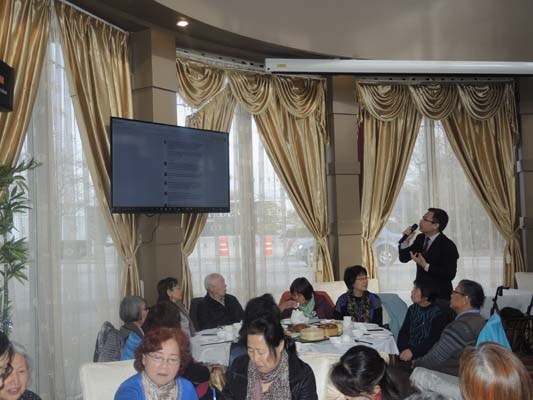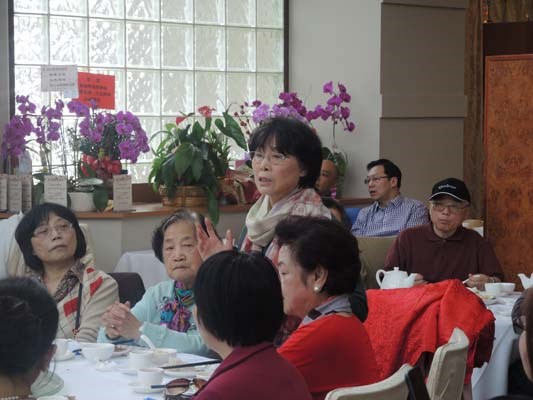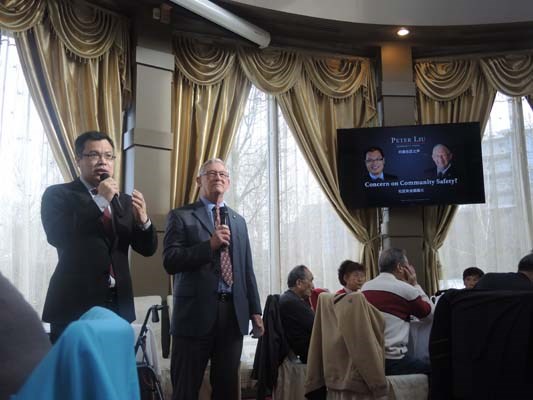Would officers in a new, Richmond police force speak Chinese?
More Chinese-speaking seniors in Richmond should make a bigger effort to speak English.
And more English language teachers are needed in the city for Chinese seniors to learn one of Canada’s official tongues more efficiently.
These questions and concerns were just some of the issues raised Friday by the Chinese community during 90-minute long meeting on community safety hosted by businessman Peter Liu at a restaurant in Golden Village.
Just under 100 people — all but three, including guest speaker Coun. Bill McNulty, were of Chinese ethnicity and most were in their senior years — turned out at the China House Seafood Restaurant on Capstan Way.
Liu organized the question and answer event, the first in a series, to bridge the language barrier between the Chinese community and city council, saying there are simply too many people in the community who don’t speak English and are not able to express their concerns to city hall.
“It was a very promising start, although it did take time to warm up,” said Liu of the event, where attendees were treated to free dim sum, courtesy of the China House sponsors.
“I’m actually organizing the next (meeting) right now. I’m hoping to get another councillor, MLA or an MP. The subject is likely still to be community safety as it’s a hot topic.”
McNulty, who had the help of Liu translating on the day, said the event was “outstanding.”
“There were some very good issues; it was way better than anticipated,” he said.
“People’s concerns were expressed and I was impressed by the depth of the questions.”
Moments before the event kicked off, McNulty told the Richmond News how it’s important “We come to their ‘home;’ this is where they eat every day, Chinese people rarely eat at home,” in reference to holding the meeting in a Chinese restaurant.

As Chinese copies of the City of Richmond’s police survey, handed out by Liu, circulated the room, the Richmond News’ Facebook posting of an earlier story about the meeting was shown on the restaurant’s large TV screens.
Pointing to the screens and highlighting public comments on the Facebook page, Liu talked about the reaction to the story from the English-speaking community in Richmond.
In particular, he drew attention to one comment saying, “If you don’t like it, go back to your own country” and “We are too nice in Canada.”
He told the crowd how the official languages of Canada are English and French and how he encouraged his children to learn those languages.
“I would urge everyone in this community to learn English. Richmond is not a place for hatred,” Liu added.
When asked Monday why he chose to highlight the more negative comments on the News’ Facebook page, Liu said the comments were “not reflective of what we are trying to do.
“This is not a language issue; it’s a communication issue. Even if you speak English, it’s not easy to contact your councillor.”

When the time came for questions for McNulty, people seemed reluctant to go first, while some appeared more concerned with tucking into the sponsor’s veritable feast than the proceedings.
Henry Yao, who ran unsuccessfully for city council in 2014, asked in Chinese and in English why the city was even considering an independent police force?
“Over the years, we’ve not been happy with the RCMP — they do a good job — but they are accountable to Ottawa, 4,000 miles away,” answered McNulty.
A man calling himself Frank, who moved from China 10 years ago, expressed in his own language how there are “more and more break-ins in Richmond.”
“I’ve asked police to increase patrols in certain areas,” replied McNulty.
In actual fact, according to the RCMP, break-ins were down across the city in 2015.
McNulty then urged people to join Block Watch and to call the RCMP immediately if they feel something suspicious is happening.
Yao also asked if police officers in an independent force would speak Chinese.
“Absolutely,” said McNulty, “we would need officers that reflect our community; be they Mandarin, Punjabi or Filipino.”
“Our city is growing and more than 65 per cent speak Cantonese or Mandarin.”
One man — who introduced himself as a good friend of McNulty while speaking in Chinese — urged all citizens in Richmond to study English.
He told of a neighbour who, after a misunderstanding, ended up getting handcuffed by police, because he didn’t speak English.
“Officers need to be trained to deal with multi-cultural issues, but people should make an effort to speak English,” McNulty said in reply.
“People have come to Canada and they need to embrace the country and the language. It’s a two-way street; when I go to China, I try to speak Chinese.”

Another man told how many Chinese seniors don’t speak English and how the community needs more help from volunteers or the City of Richmond to help the seniors.
“There is a limit to what we can do and we’re also limited by the number of (Chinese-speaking) people that want to work for the city,” said McNulty.
One of the three Caucasian people in attendance was community activist Kerry Starchuk, who has campaigned for years for a certain percentage of English to become mandatory on signs across Richmond.
“This is a good start,” said Starchuk, when asked about the meeting.
“But where are the East Indians, the South Koreans? This, essentially, is a Chinese event.”
Liu said before last week’s meeting how it’s incumbent upon city council and officials to communicate in a language the growing Chinese-speaking community understands.
However, Starchuk questioned who, in actual fact, is responsible for such an imbalance.
“It’s not the new immigrants, it’s the leadership (in government),” she said.
Starchuk did, however, think the event was positive, but would like to see more ethnicities represented at the next meeting.
“How do we get these people speaking English? If you’re motivated and make time, it can happen,” she added.



